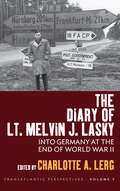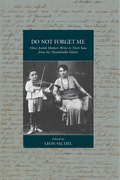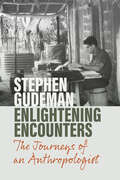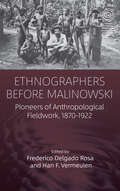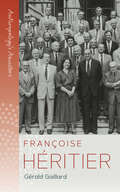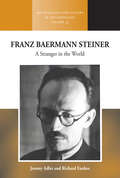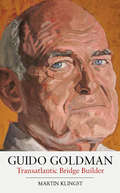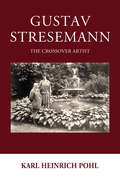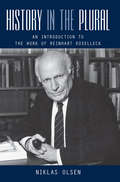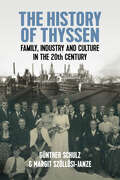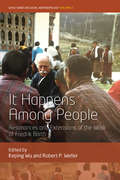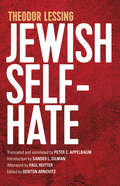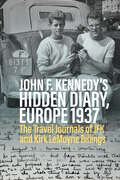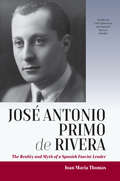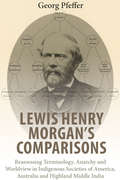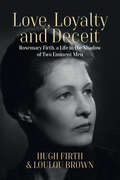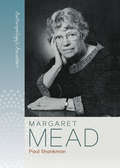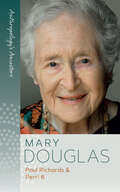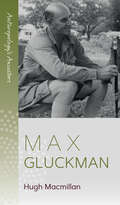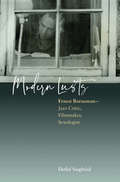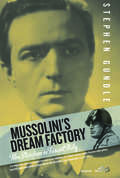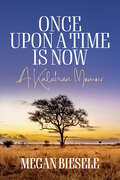- Table View
- List View
The Diary of Lt. Melvin J. Lasky: Into Germany at the End of World War II (Transatlantic Perspectives #7)
by Charlotte A. LergIn 1945 Melvin J. Lasky, serving in one of the first American divisions that entered Germany after the country’s surrender, began documenting the everyday life of a defeated nation. Travelling widely across both Germany and post-war Europe, Lasky’s diary provides a captivating eye-witness account colored by ongoing socio-political debates and his personal background studying Trotskyism. The Diary of Lt. Melvin J. Lasky reproduces the diary’s vivid language as Lasky describes the ideological tensions between the East and West, as well as including critical essays on subjects ranging from Lasky’s life as a transatlantic intellectual, the role of war historians, and the diary as a literary genre.
The Diary of Lt. Melvin J. Lasky: Into Germany at the End of World War II (Transatlantic Perspectives #7)
by Charlotte A. Lerg"'The Diary of Lt. Melvin J. Lasky' offers not only a panoramic view of a country poised between devastation and an uncertain future but a gripping self-portrait of a man poised between unresolved youthful bewilderment and a mature clarity of conviction." • Wall Street Journal In 1945 Melvin J. Lasky, serving in one of the first American divisions that entered Germany after the country’s surrender, began documenting the everyday life of a defeated nation. Travelling widely across both Germany and post-war Europe, Lasky’s diary provides a captivating eye-witness account colored by ongoing socio-political debates and his personal background studying Trotskyism. The Diary of Lt. Melvin J. Lasky reproduces the diary’s vivid language as Lasky describes the ideological tensions between the East and West, as well as including critical essays on subjects ranging from Lasky’s life as a transatlantic intellectual, the role of war historians, and the diary as a literary genre.
Do Not Forget Me: Three Jewish Mothers Write to Their Sons from the Thessaloniki Ghetto (War and Genocide #32)
by Leon SaltielFollowing the Axis invasion of Greece, the Nazis began persecuting the country’s Jews much as they had across the rest of occupied Europe, beginning with small indignities and culminating in mass imprisonment and deportations. Among the many Jews confined to the Thessaloniki ghetto during this period were Sarina Saltiel, Mathilde Barouh, and Neama Cazes—three women bound for Auschwitz who spent the weeks before their deportation writing to their sons. Do Not Forget Me brings together these remarkable pieces of correspondence, shocking accounts of life in the ghetto with an emotional intensity rare even by the standards of Holocaust testimony.
Do Not Forget Me: Three Jewish Mothers Write to Their Sons from the Thessaloniki Ghetto (War and Genocide #32)
by Leon SaltielFollowing the Axis invasion of Greece, the Nazis began persecuting the country’s Jews much as they had across the rest of occupied Europe, beginning with small indignities and culminating in mass imprisonment and deportations. Among the many Jews confined to the Thessaloniki ghetto during this period were Sarina Saltiel, Mathilde Barouh, and Neama Cazes—three women bound for Auschwitz who spent the weeks before their deportation writing to their sons. Do Not Forget Me brings together these remarkable pieces of correspondence, shocking accounts of life in the ghetto with an emotional intensity rare even by the standards of Holocaust testimony.
Enlightening Encounters: The Journeys of an Anthropologist
by Stephen GudemanOne of the world's top anthropologists recounts his formative experiences doing fieldwork in this accessible memoir ideal for anyone interested in anthropology. Drawing on his research in five Latin American countries, Steve Gudeman describes his anthropological fieldwork, bringing to life the excitement of gaining an understanding of the practices and ideas of others as well as the frustrations. He weaves into the text some of his findings as well as reflections on his own background that led to better fieldwork but also led him astray. This readable account, shorn of technical words, complicated concepts, and abstract ideas shows the reader what it is to be an anthropologist enquiring and responding to the unexpected. From the Preface: Growing up I learned about making do when my family was putting together a dinner from leftovers or I was constructing something with my father. In fieldwork I saw people making do as they worked in the fields, repaired a tool, assembled a meal or made something for sale. Much later, I realized that making do captures some of my fieldwork practices and their presentation in this book.
Ethnographers Before Malinowski: Pioneers of Anthropological Fieldwork, 1870-1922 (EASA Series #44)
by Frederico Delgado Rosa and Han F. VermeulenFocusing on some of the most important ethnographers in early anthropology, this volume explores twelve defining works in the foundational period from 1870 to 1922. It challenges the assumption that intensive fieldwork and monographs based on it emerged only in the twentieth century. What has been regarded as the age of armchair anthropologists was in reality an era of active ethnographic fieldworkers, including women practitioners and Indigenous experts. Their accounts have multiple layers of meaning, style, and content that deserve fresh reading. This reference work is a vital source for rewriting the history of anthropology.
Ethnographers Before Malinowski: Pioneers of Anthropological Fieldwork, 1870-1922 (EASA Series #44)
by Frederico Delgado Rosa and Han F. VermeulenFocusing on some of the most important ethnographers in early anthropology, this volume explores twelve defining works in the foundational period from 1870 to 1922. It challenges the assumption that intensive fieldwork and monographs based on it emerged only in the twentieth century. What has been regarded as the age of armchair anthropologists was in reality an era of active ethnographic fieldworkers, including women practitioners and Indigenous experts. Their accounts have multiple layers of meaning, style, and content that deserve fresh reading. This reference work is a vital source for rewriting the history of anthropology.
Françoise Héritier (Anthropology's Ancestors #3)
by Gérald GaillardFollows the life of French anthropologist Françoise Héritier, who had a lasting impact on a generation of French anthropologists that continues to this day. A great intellectual figure, Françoise Héritier succeeded Claude Lévi-Strauss as the Chair of Anthropology at the Collège de France in 1982. She was an Africanist, author of magnificent works on the Samo population, the scientific progenitor of kinship studies, the creator of a theoretical base to feminist thought and an activist for many causes. “I read this intellectual biography of Françoise Héritier with great pleasure. Though highly regarded in France, she is not yet well known in English-language academic circles, but she certainly should be. This book will be a revelation to many anthropologists and feminist scholars.”—Adam Kuper, London School of Economics From the Forword by Michelle Perrot: I came to know her at the National Council for HIV, that she chaired from 1989 to 1994…. Her theoretical concerns were also crucial to the understanding of pandemics, but we did not then realise that HIV/AIDS was also a precursor and a warning of pandemics to come. She grasped the importance of conceptions of bodily ‘humours’—blood, semen, milk—that seemed to play a role in the horrific spread of an epidemic of which we knew nothing, except that it resulted in an appalling mortality rate, particularly among young men…. she was a remarkable chair, concerned to share her insights into the illness and to anchor—necessary—interventions within a framework that would be respectful of human rights.
Franz Baermann Steiner: A Stranger in the World (Methodology & History in Anthropology #42)
by Jeremy Adler Richard FardonFranz Baermann Steiner (1909-52) provided the vital link between the intellectual culture of central Europe and the Oxford Institute of Anthropology in its post-Second World War years. This book demonstrates his quiet influence within anthropology, which has extended from Mary Douglas to David Graeber, and how his remarkable poetry reflected profoundly on the slavery and murder of the Shoah, an event which he escaped from. Steiner’s concerns including inter-disciplinarity, genre, refugees and exile, colonialism and violence, and the sources of European anthropology speak to contemporary concerns more directly now than at any time since his early death.
Guido Goldman: Transatlantic Bridge Builder
by Martin KlingstThe son of Nahum Goldmann, who was the founder of the World Jewish Congress, Guido Goldman was one of the most distinguished protagonists of the reintegration of Germany into the international community after the defeat of Nazism in 1945. Later he helped establish the German Marshall Fund and created Harvard University’s Center for European Studies as one of the pre-eminent research institutes and meeting places in the world for scholars, graduate students, prominent politicians, and artists. His large network of friends and interlocutors included Willy Brandt and Helmut Kohl, Henry Kissinger and Ronald Reagan, Harry Belafonte and Marlene Dietrich. His generous philanthropy extended to the preservation of non-Western cultures threatened by extinction, such as the IKAT project through which he revived the unique ancient textile arts of Central Asia. All this comes alive in Martin Klingst’s careful reconstruction of Goldman's life.
Gustav Stresemann: The Crossover Artist (Studies in German History #23)
by Karl Heinrich PohlAs a foreign minister and chancellor of Weimar Germany, Gustav Stresemann is a familiar figure for students of German history – one who, for many, embodied the best qualities of German interwar liberalism. However, a more nuanced and ambivalent picture emerges in this award-winning biography, which draws on extensive research and new archival material to enrich our understanding of Stresmann’s public image and political career. It memorably explores the personality of a brilliant but flawed politician who endured class anxiety and social marginalization, and who died on the eve of Germany’s descent into economic and political upheaval.
History In The Plural
by Niklas OlsenReinhart Koselleck (1923-2006) was one of most imposing and influential European intellectual historians in the twentieth century. Constantly probing and transgressing the boundaries of mainstream historical writing, he created numerous highly innovative approaches, absorbing influences from other academic disciplines as represented in the work of philosophers and political thinkers like Hans Georg Gadamer and Carl Schmitt and that of internationally renowned scholars such as Hayden White, Michel Foucault, and Quentin Skinner. An advocate of "grand theory," Koselleck was an inspiration to many scholars and helped move the discipline into new directions (such as conceptual history, theories of historical times and memory) and across disciplinary and national boundaries. He thus achieved a degree of international fame that was unusual for a German historian after 1945. This book not only presents the life and work of a "great thinker" and European intellectual, it also contributes to our understanding of complex theoretical and methodological issues in the cultural sciences and to our knowledge of the history of political, historical, and cultural thought in Germany from the 1950s to the present.
The History of Thyssen: Family, Industry and Culture in the 20th Century
by Günther Schulz Margit Szöllösi-JanzeAs a result of a multi-volume research project, funded by the Thyssen Foundations (Stiftung zur Industriegeschichte Thyssen and Fritz Thyssen Stiftung), ten books were published that served to greatly advance the available knowledge on the Thyssen family and their companies. The results of this project are summarized in this volume which provides both an explanation of how the project was conceptualized and executed and a detailed case study of a family and their business during the late-nineteenth and twentieth centuries. It explains the development of both whilst addressing issues such as patriarchal succession; gender roles in the family; wealthy lifestyles in international communities of aristocrats and diplomats; operating across national legislation, institutions, and policies; and discussions of labor and capital. In doing so it connects corporate and family history to provide an all-inclusive view of the development of a business.
It Happens Among People: Resonances and Extensions of the Work of Fredrik Barth (WYSE Series in Social Anthropology #8)
by Keping Wu Robert P. WellerWritten by eleven leading anthropologists from around the world, this volume extends the insights of Fredrik Barth, one of the most important anthropologists of the twentieth century, to push even further at the frontiers of anthropology and honor his memory. As a collection, the chapters thus expand Barth’s pioneering work on values, further develop his insights on human agency and its potential creativity, as well as continuing to develop the relevance for his work as a way of thinking about and beyond the state. The work is grounded on his insistence that theory should grow only from observed life.
Jewish Self-Hate
by Theodor LessingThe diagnosis of Jewish self-hatred has become almost a commonplace in contemporary cultural and political debates, but the concept’s origins are not widely appreciated. In its modern form, it received its earliest and fullest expression in Theodor Lessing’s 1930 book Der jüdische Selbsthaß. Written on the eve of Hitler’s ascent to power, Lessing’s hotly contested work has been variously read as a defense of the Weimar Republic, a platform for anti-Weimar sentiments, an attack on psychoanalysis, an inspirational personal guide, and a Zionist broadside. This new edition makes a seminal text in Jewish thought accessible to English readers for the first time.
John F. Kennedy’s Hidden Diary, Europe 1937: The Travel Journals of JFK and Kirk LeMoyne Billings
by Oliver LubrichPresenting the 1937 diaries of John F. Kennedy’s tour of Europe, this volume offers insights into his early experiences on a continent under the shadow of Nazism. In 1937, while still a student, John F. Kennedy undertook a grand tour of Europe with his close friend and traveling companion, Lem Billings. On this journey he began to keep a diary, which is reproduced here in full and provides an unadulterated account of his thoughts and feelings. Superficially, it presents a picture of two young men enjoying their summer, sightseeing, going to the movies, bars and night clubs; but behind this we find, in Kennedy’s political observations and encounters, the looming shadow of Nazism. In retrospect there are blind spots and misjudgments, but also insights of great topicality, for example on populism, and propaganda and its potent effects. On this trip and during his later travels in Germany, Kennedy engaged with the crucial questions of his later presidency: How does a dictatorship work? How is an alternative concept of society to be countered? And how can an impending war be averted? Kennedy’s European and Russian policies and also his famous Berlin speech of 1963 (“Ich bin ein Berliner”) are to be understood against this background. In addition to numerous archive photographs, this volume contains Kennedy’s complete diary of his 1937 trip to Europe and, as a counterpart, the “Scrapbook” of Lem Billings who documented it from his perspective.
José Antonio Primo de Rivera: The Reality and Myth of a Spanish Fascist Leader (Studies in Latin American and Spanish History #3)
by Joan Maria ThomàsThere are few individuals in modern Spanish history that have been as thoroughly mythologized as José Antonio Primo de Rivera, a leading figure in the Spanish Civil War who was executed by the Republicans in 1936 and celebrated as a martyr following the victory of the Falangists. In this long-awaited translation, Joan Maria Thomàs provides a measured, exhaustively researched study of Primo de Rivera’s personality, beliefs, and political activity. His biography shows us a man dedicated to the creation of a fascist political regime that he aspired to one day lead, while at the same carefully distinguishing his aims from those of the Falangists and the Franco Regime.
Lewis Henry Morgan's Comparisons: Reassessing Terminology, Anarchy and Worldview in Indigenous Societies of America, Australia and Highland Middle India
by Georg PfefferAbout 150 years ago L. H. Morgan compared relationship terminologies, societal forms, and ideas of property to recognize the interdependence of the three domains. From a new perspective, the book will re-examine, confirm and criticize, Morgan’s findings to conclude that reciprocal affinal relations determine most ‘classificatory’ terminologies and regulate many non-state societies, their property notions, and their rituals. Apart from references to American and Australian features, such holistic socio-cultural constructs will be exemplified by elaborate descriptions of little-known contemporary indigenous societies in highland Middle India, altogether comprising many millions of members.
Love, Loyalty and Deceit: Rosemary Firth, a Life in the Shadow of Two Eminent Men
by Hugh Firth Loulou BrownHow much do we really know about our parents’ lives? What secrets lie in plain sight? This is the true story of hidden love within a small circle of some of the most acclaimed anthropologists of the 20th century. Told by Rosemary and Raymond Firth's son, and the daughter of Celia and Edmund Leach, the man Rosemary loved all her life, this part love-story, part biography, part social history is the tale of a highly influential circle of social anthropologists in Britain from the 1930s, through the Second World War, to the end of the century. The book explores their early influences, their insecurities, their flaws, struggles and achievements. It is a story of passion and commitment, but also of deceit and betrayal, including the inexplicable disappearance, death and alleged murder of a very close friend. It also narrates Rosemary's struggles for emotional and intellectual independence in the face of societal expectations of women and her own guilt, loss and self-doubt. From the Prologue: Rosemary loved many people in many different ways, but she loved two men in particular throughout most of her life. One was her husband, Raymond Firth, regarded by some as among the founding fathers of social anthropology. Yet she also retained a passionate devotion to her first love, Edmund Leach, who would subsequently become the public intellectual face of social anthropology in the later 1960s. Both separately and together they were part of the process of defining the nature of this still growing discipline in the first part of the mid-twentieth century.
Margaret Mead: Anatomy Of An Anthropological Controversy (Anthropology's Ancestors #1)
by Paul ShankmanTracing Mead’s career as an ethnographer, as the early voice of public anthropology, and as a public figure, this elegantly written biography links the professional and personal sides of her career. The book looks at Mead’s early career through the end of World War II, when she produced her most important anthropological works, as well as her role as a public figure in the post-war period, through the 1960s until her death in 1978. The criticisms of Mead are also discussed and analyzed. This short volume is an ideal starting point for anyone wanting to learn about, arguably, the most famous anthropologist of the twentieth century.
Mary Douglas (Anthropology's Ancestors #4)
by Paul Richards Perri 6This handy, concise book covers the life of Mary Douglas, one of the most important anthropologists of the second half of the 20th century. Her work focused on how human groups classify one another, and how they resolve the anomalies that then arise. Classification, she argued, emerges from practices of social life, and is a factor in all deep and intractable human disputes. This biography offers an introduction to how her distinctive approach developed across a long and productive career and how it applies to current pressing issues of social conflict and planetary survival. From the Preface: The influence of Professor Dame Mary Douglas (1921-2007) upon each of the social sciences and many of the disciplines in the humanities is vast. The list of her works is also vast, and this presents a problem of choice for the many readers who want to get a general idea of what she wrote and its significance, but who are somewhat baffled about where to begin. Our book offers a short overview and suggests why her key writings remain significant today.
Max Gluckman (Anthropology's Ancestors #6)
by Hugh MacmillanThis handy, concise biography describes the life and intellectual contribution of Max Gluckman (1911-75) who was one the most significant social anthropologists of the twentieth century. Max Gluckman was the founder in the 1950s of the Manchester School of Social Anthropology. He did fieldwork among the Zulu of South Africa in the 1930s and the Lozi of Northern Rhodesia/Zambia in the 1940s. This book describes in detail his academic career and the lasting influence of his Analysis of A Social Situation in Modern Zululand (1940-42) and of his two large monographs on the legal system of the Lozi. From the Introduction: Max Gluckman was the most influential of a group of social anthropologists who emerged from South Africa during the 1930s into what was essentially a new academic discipline. His description and analysis of events in real time implied a rejection of contemporary social anthropological practice, of the ‘ethnographic present’, and of hypothetical or conjectural reconstructions and an acceptance of the need to study ‘primitive’ societies in the context of the modern world.
Modern Lusts: Ernest Borneman: Jazz Critic, Filmmaker, Sexologist
by Detlef SiegfriedAs a jazz musician, filmmaker, anthropologist, sexologist, and crime novelist, the boundlessly curious German autodidact Ernest Borneman exemplified the conflicting cultural and intellectual currents of the twentieth century. In this long-awaited English translation, acclaimed historian Detlef Siegfried chronicles Borneman’s journey from a young Jewish Communist in Nazi Berlin to his emergence as a celebrated (and reliably controversial) transatlantic polymath. Through an innovative structure organized around the human senses, this biography memorably portrays a figure whose far-flung obsessions comprised a microcosm of postwar intellectual life.
Mussolini's Dream Factory
by Stephen GundleThe intersection between film stardom and politics is an understudied phenomenon of Fascist Italy, despite the fact that the Mussolini regime deemed stardom important enough to warrant sustained attention and interference. Focused on the period from the start of sound cinema to the final end of Fascism in 1945, this book examines the development of an Italian star system and evaluates its place in film production and distribution. The performances and careers of several major stars, including Isa Miranda, Vittorio De Sica, Amedeo Nazzari, and Alida Valli, are closely analyzed in terms of their relationships to the political sphere and broader commercial culture, with consideration of their fates in the aftermath of Fascism. A final chapter explores the place of the stars in popular memory and representations of the Fascist film world in postwar cinema.
Once Upon a Time is Now: A Kalahari Memoir
by Megan BieseleFifty years after her first fieldwork with Ju/'hoan San hunter-gatherers, anthropologist Megan Biesele has written this exceptional memoir based on personal journals she wrote at the time. The treasure trove of vivid learning experiences and nightly ponderings she found has led to a memoir of rare value to anthropology students and academics as well as to general readers. Her experiences focus on the long-lived healing dance, known to many as the trance dance, and the intricate beliefs, artistry, and social system that support it. She describes her immersion in a creative community enlivened and kept healthy by that dance, which she calls "one of the great intellectual achievements of humankind." From the Preface: A few years ago I finally got around to looking back into the box of personal field journals I had not opened for over forty years. I found a treasure trove. It was an overwhelming experience. So much that I had forgotten came vividly alive: I laughed, wept, and was terrified all over again at my temerity in taking on what I had taken on. To do justice to the richness of these notebooks, I realized, I would have to do a completely different sort of writing from anything I had ever done before.
